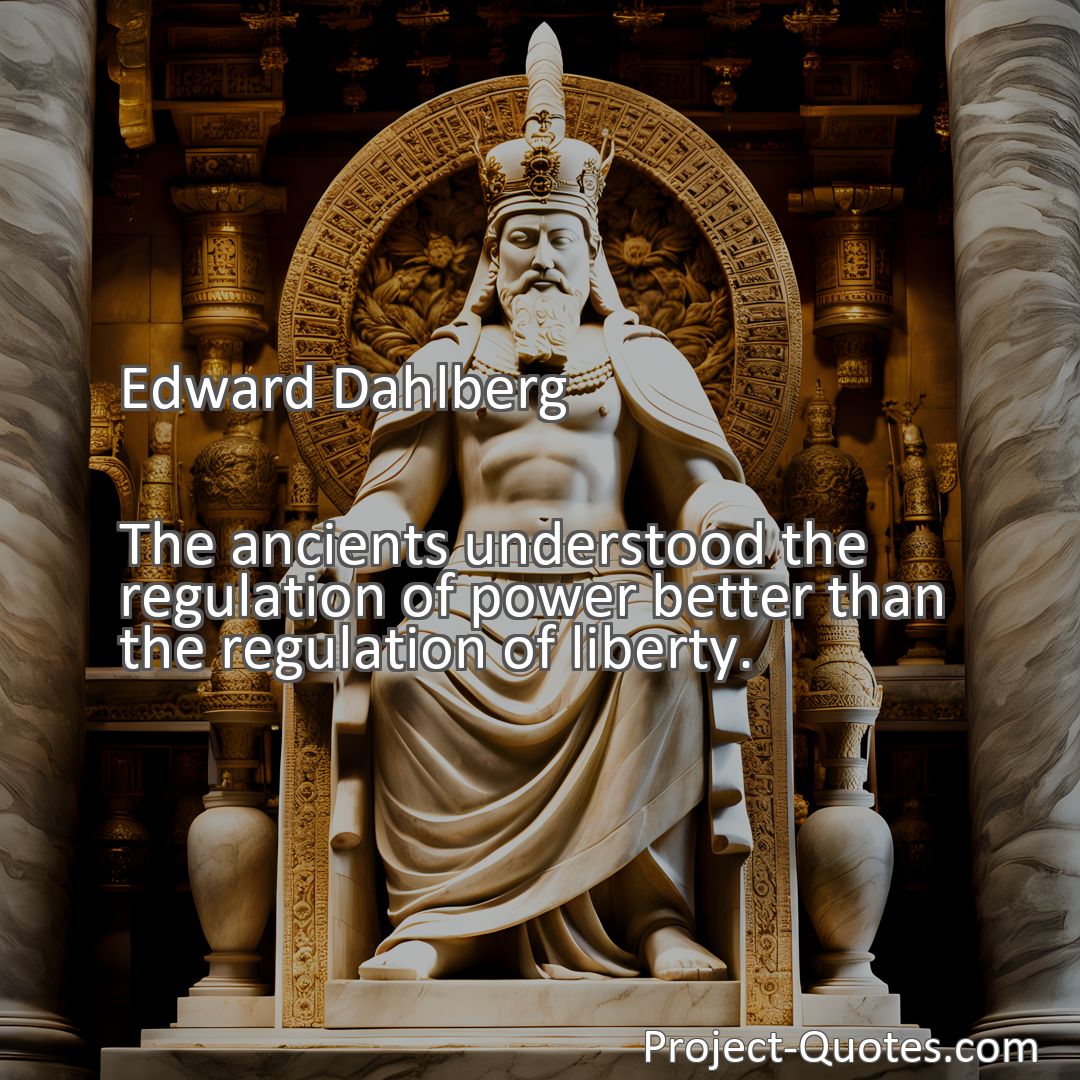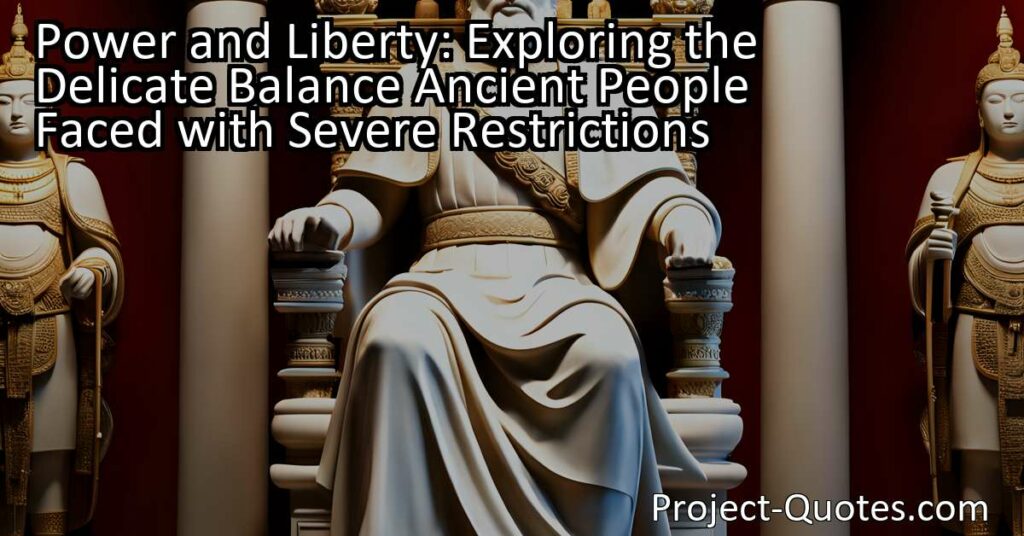The ancients understood the regulation of power better than the regulation of liberty.
Edward Dahlberg
Ancient civilizations often saw a stark imbalance between power and liberty, as rulers wielded absolute power while the common people faced severe restrictions. This resulted in social inequality and discontent among the populace. While the ancients excelled at regulating power, their understanding of balancing this power with individual liberties was limited.
Table of Contents
Meaning of Quote – The ancients understood the regulation of power better than the regulation of liberty.
Have you ever wondered about the balance between power and liberty? In his thought-provoking statement, Edward Dahlberg suggests that the ancients possessed a greater understanding of regulating power than they did of regulating liberty. This quote sparks curiosity and invites us to delve deeper into the topic. Join me as we explore the significance of power and liberty, their interplay throughout history, and the insights that the ancients provide in navigating this delicate balance.
Power and liberty are fundamental concepts that have shaped societies since the dawn of civilization. Power can be defined as the ability to influence others or control resources, while liberty refers to the freedom to act, think, and speak without restraint. Both are essential aspects of societal structure, and striking the right balance between them is crucial for a healthy and thriving community.
When we examine history, we can observe numerous instances where power has been wielded without regard for individual liberty. Throughout ancient civilizations, rulers often seized power and ruled with an iron fist, suppressing the freedoms of their subjects. The ancient pharaohs of Egypt, for example, enjoyed nearly absolute power, while the common people faced severe restrictions in their daily lives. This imbalance of power and limited liberty resulted in social inequality and discontent among the populace. Dahlberg’s statement suggests that the ancients excelled at regulating power, maintaining their authority, but struggled to ensure individual freedoms alongside it.
However, it is important to note that while the ancients may have struggled with balancing power and liberty, their understanding of power dynamics was extensive. Ancient societies were often hierarchical, with rulers at the top, and they employed various methods to establish and maintain their authority. Systems such as monarchy, oligarchy, and even autocracy were prevalent in many ancient civilizations, allowing those in power to solidify their positions and exert control over their subjects. Ancient philosophers like Plato and Aristotle extensively studied the nature of power and its appropriate distribution within society. The insights gleaned from these studies have significantly influenced political theory and governance throughout the ages.
One notable aspect of power regulation in ancient civilizations was the concept of divine right. Many ancient rulers believed that their power was bestowed upon them by the gods, making their authority unquestionable. Pharaohs, emperors, and kings often used this reasoning to maintain their hold on power. In such cases, the idea of limiting power might have seemed absurd, as it would imply defiance of divine will. This perspective sheds light on why ancient societies may have prioritized regulating power rather than liberty.
As societies progressed and evolved, attempts to strike a balance between power and liberty became more apparent. The advent of democracy in ancient Greece is a prime example. The city-state of Athens, often hailed as the birthplace of democracy, introduced the idea of citizen participation and government by the people. Athenian citizens were granted certain rights and liberties, including the right to vote and actively participate in the decision-making processes. While this was a significant step towards granting more liberty to the people, it is important to recognize that even in a democratic system, power imbalances may prevail. The power of the assembly and the influence of the wealthy elite could overshadow the liberties of marginalized groups, such as women and slaves.
The tension between power and liberty continued to shape historical events, and it still resonates in contemporary societies. The rise and fall of empires, revolutions against oppressive regimes, and ongoing debates over fundamental rights all reflect the struggle to find equilibrium. From the Magna Carta of 1215 to the American Declaration of Independence in 1776, countless historical documents have sought to codify and protect individual liberties, recognizing the potential harm that unchecked power can inflict.
Yet, despite these efforts, it remains a challenge to strike the ideal balance between power and liberty. In modern times, governments can accumulate significant power through multiple avenues such as legislation, executive orders, and control over economic resources. It becomes crucial for societies to remain vigilant in regulating power, ensuring that it does not encroach upon individual liberties in the pursuit of stability or security. Dahlberg’s assertion that the ancients understood the regulation of power better than the regulation of liberty prompts us to examine both historical and contemporary efforts in striking this delicate balance.
In conclusion, Edward Dahlberg’s thought-provoking statement invites us to consider the delicate balance between power and liberty throughout history. While the ancients may have excelled at regulating power, their understanding of balancing this power with individual liberties was more limited. As societies have progressed, attempts to find this equilibrium have become increasingly important. From ancient hierarchies to the rise of democracy, the struggle between power and liberty has shaped societies and fueled the desire for greater freedom. By revisiting the insights of the ancients and learning from our collective history, we have the opportunity to ensure a more balanced and just future, where both power and liberty are regulated harmoniously for the prosperity of all.
I hope this quote inspired image brings you hope and peace. Share it with someone who needs it today!


